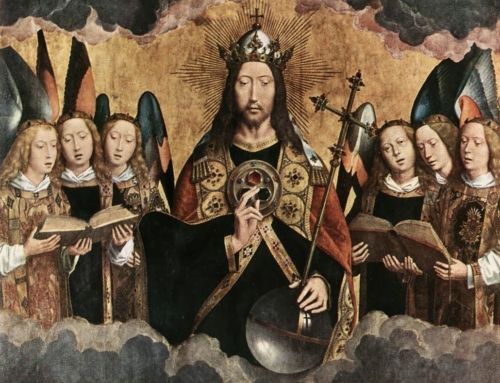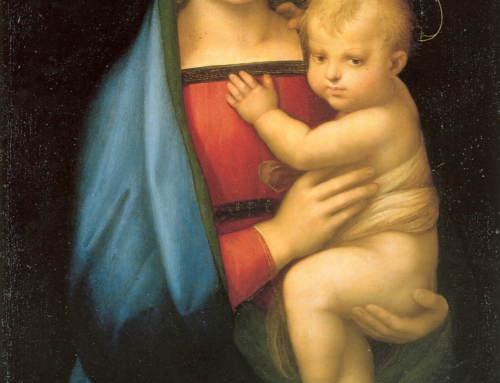Fr DL: Fr CJ McCloskey was a good priest. He befriended me when I lived in England and was very low. I’d been waiting for ordination for eight years at that point and I kept getting beat up by members of the hierarchy. CJ took me out to dinner, listened to my story and prophesied that I would never be ordained in England but would return to my native USA and have a ministry there which would be far greater than if I had ever been ordained in England. We stayed in our home and spent an afternoon touring Somerset. We went to Bath, Downside Abbey and while zooming down one road he saw a signpost to Mells and said, “That’s where Ronnie Knox is buried! Let’s go find his grave.” So we did. He stayed in touch and eventually (I think but am not certain) helped move my paperwork forward in Rome so I could be ordained. If he is guilty of the allegations, we should remember the good things he did, not just the bad.
Angry Catholic: I can’t believe it! You’re excusing his crimes! You’re a married man. How would you feel if a priest groped your wife while she was going to him for counseling?
Fr DL: I’d be upset, but I’d also want to know what exactly he did. The term “groping” nowadays could mean anything from patting someone’s backside to crude rummaging in their underwear. Look, we live in a very volatile society in this “MeToo” age. These explosive terms can mean most anything. When I was a school chaplain I dealt with a teenaged girl who came to me in tears with the accusation that her mother was abusing her. I believed the girl and thought the mom was some kind of witch that was locking her in the cupboard and burning her with a cigarette and maybe farming her out to her trashy boyfriend. It turned out by “abuse” the girl meant that sometimes her mom lost her temper and yelled at her to clean up her room. See what I mean?
AC: This is incredible. You’re whitewashing this whole thing and minimizing his crime because he’s your pal. This is why the church is in such a terrible state.
Fr DL: I’m not minimizing his actions, but I’m also not maximizing them. I’m saying the facts of the case are important and news headlines never tell the whole story, and one should always keep a sense of proportion.
AC: You’re not! You’re saying there’s nothing wrong with a little grope here and there.
Fr DL: Take a deep breath. That’s not what I’m saying at all. I’m not excusing Fr McCloskey, but I am suggesting we treat accusations with an eye towards facts not just emotions.
AC: Unbelievable. This is exactly how the whole clerical abuse thing snowballs. The other priests’ first instinct is to protect the the brother priest and blame the victim.
Fr DL: I agree that this has happened and I agree that it stinks, but hang on a minute. I’m not excusing Fr McCloskey. However, everybody deserves a fair hearing. If he really is guilty, then he should step away from his priestly ministry. But as I understand it, that is precisely what he has done. He has assumed a lower profile and stepped away from a public ministry. It seems he was appropriately disciplined by his order and a payment was made to the woman who complained. You can read about it here. What else do you suggest should be done?
AC: But he’s a predator priest and as usual they covered it up.
Fr DL: Those in charge also have a responsibility to the victim. It may be that she did not want the whole business to be made public.
AC: Weasel words. He should be punished. I guess you’d try to excuse Cardinal McCarrick too?
Fr DL: Let me repeat. I’m not excusing Fr McCloskey, but stop for a moment. Are you equating Fr. McCloskey’s crimes with those of Theodore McCarrick? Surely you can see that they are not of the same order of severity? Assuming Fr McCloskey is guilty, touching an adult woman inappropriately while still clothed is a far cry from the long term, pre meditated, intentional grooming, spiritual, emotional and sexual abuse of a vulnerable child of which McCarrick is accused.
AC: They’re both criminals.
Fr DL: They’re both accused of sexual misconduct, but anyone can see that their crimes are not of the same order.
AC: I can’t believe you would use Fr McCloskey’s crimes to blame the victim.
Fr DL: Excuse me? I don’t follow.
AC: You’re excusing him and blaming the people who are calling him out. You’re making people like me the criminals in all this!
Fr DL: I’m sorry, but that thinking is kind of twisted.
AC: See? Now you’re blaming me for being crazy. That’s called “gas lighting” The victim is not only blamed but they must be crazy.
Fr DL: So you’re the victim now? I’m sorry I lost the train of thought.
AC: You’re so calm about this and now you come over with your condescending superior priestly act. It makes me sick.
Fr DL: OK, you silly idiot, do you want me to go get a bucket so you can vomit? Is that what you want you thick headed jerk?
AC: Now who’s getting angry?
Fr DL: I thought you didn’t like it when I was being calm and rational? Anyway. I was just pretending. I’ll go back to being condescending again.
AC: Look Father, I’m tired of all these payouts and cover ups. It always happens with the celebrity priests too–the ones working in DC and New York and LA. They always get one of their fat cat friends to pay the woman off. She probably had a confidentiality clause in the deal forcing her to keep her trap shut.
Fr DL: I get it that you’re angry. I’m angry about the corruption and immorality among the clergy too, but after we’ve all cooled down shouldn’t a search for justice and mercy prevail?
AC: What about the victim!
Fr DL: The woman who made the accusation received a pretty hefty payout. What other form of assistance or reparation did you have in mind?
AC: I think guys like him should pay for what they’ve done!
Fr DL: I do too, but do you think you’re being fair? And what about the Christian virtues of forgiveness and reparation? We don’t know all the details, but it would seem that Fr McCloskey has been disciplined by his order. If he is guilty, one assumes he has made a good confession. After repentance and reparation should he not be forgiven? Isn’t that what our faith is all about?
AC: There you go again, excusing his crimes. I think he should burn in hell!
Fr DL: I wonder, have you ever read the gospel at all? You say you are a “good Catholic” but have you even registered or absorbed the tiniest bit of the gospel of Jesus Christ? What do you think he meant when he said, “Do not judge or you will be judged”?
AC: Now you’re sounding like Pope Francis and the gays!
Fr DL: I’m sorry if I quoted a pope who was quoting the words of the Lord Jesus Christ. Allow me to continue. The gospel says that “in the same way you judge you will be judged and as you measure out so it will be measured out to you.” Are you honestly free of all kinds of sin yourself? Do you wish to be remembered for the good things you’ve done or the stupid, selfish, sinful and shameful things you’ve done?” If Fr CJ is guilty, and has repented and paid a price, and the victim was offered all help possible, then the right thing was done and we should remember the good he has done, and remember his failure as a reminder of our own human frailty. “There but for the grace of God go I.”
AC: And I guess you’d want us to do the same with McCarrick?
Fr DL: Yes I do actually. In fact, I believe God’s love and forgiveness extends to everyone no matter how wicked if they will accept it with repentance and reparation, and as much as I can, I want to be a minister of that reconciliation. I remember once blogging about the forgiveness extended to the Commandant of Auschwitz–Rudolf Hoess. You can read the blog post here. A reader sent me a note spitting with rage saying, “I’m not a Catholic and I would never join a religion that would forgive a monster like Hoess!”
AC: Exactly.
Fr DL: I answered the guy saying, “That’s precisely why I am a Catholic–because I believe in forgiveness–even when it’s messy and costly. Especially when it’s messy and costly.”







I knew McCloskey when he was in DC. I mentioned to him that I was working on a book on sexual abuse in the Catholic Church (which came out as Sacrilege). He strongly advised me to drop the project; perhaps he had personal reasons for that advice.
Pastoral counseling has been the downfall of many a minister and priest. Even in the nineteenth century, newspapers editorialized about the dangers when a minister was closeted for hours with a woman discussing intimate matters.
A church journal warned of the dangers of giving the clergy, who moved largely in a world of women, unrestricted access to women: “No man in the world has so few conditions imposed upon him at the threshold of society as the clergyman. His passport to social life is almost a carte blanche. Women of both states [married and single] and all ages are his companions, socially and professionally. The rules of social intercommunication between the sexes are, in his case, virtually suspended.” Because of this intimacy, as The Pulpit observed in 1871, “there is no profession, class or avocation, so exposed to or tormented by the devil of sensuality as the ministry. The very sanctity of their office is an occasion of their stumbling. The office is confounded with its occupant, the sanctity of the former is made the possession of the latter. Now, the office is an invulnerable myth; its occupant is a man of like passions with other men.” A Methodist Discipline warned ministers: “Converse sparingly, and conduct yourself prudently with women”; and a minister warned other ministers: “You are men, with the passions of men, exposed to the temptations of men, and in the name of God we charge you to remember this matter.” Some forgot. As did McCloskey.
By the way, notice the careful Jesuitical phrasing by Opus Dei:
“Finnerty said the settlement for McCloskey is the only sexual misconduct settlement Opus Dei has ever paid out in the United States.”
Finnerty does not say that this is the only allegation about clerical conduct that Opus Dei has received in the United States (I know it isn’t); and he says it is the only case in the United States involving a payout (but other countries?)
I don’t think that McCloskey should have been allowed to hear confessions; even if he was not guilty of solicitation in the confessional or absolving an accomplice (both entailing excommunication), he had demonstrated that he could not be trusted with intimate communications. Forgiveness does not entail restoration to positions of trust.
I hope he fully repented; he no doubt did a lot of good, but he also contributed to corruption in the church. Like many people, he could compartmentalize his life, and like many people, he seems to have put sexuality in a special compartment in which the commandments did not fully apply.
A major message Father Longenecker wrote above: We should treat accusations with an eye towards facts not just emotions. Explosive terms can mean most anything. The facts of the case are important and news headlines never tell the whole story, and one should always keep a sense of proportion.
____
So, unless we have thoroughly reviewed the entire case record and both civil and canon law, it is impossible for any of us to reach a sound judgment. And, as laymen, that is not our job. But it is the job of the involved Bishop and Pope. They have the power and responsibility to investigate, decide, and take appropriate action.
Apparently there is much room for great improvement in sorting out accusations and taking appropriate action. The US Church took some action about 15 years ago. It seems that was not enough. Now Pope Francis is attempting to deal with fixing the process.
Half the problem is making reparations to the abused. Some dioceses have declared bankruptcy. The other half is ensuring the abusers no longer have positions of trust in the Church. Bishops and the Pope need to do much better.
I’ve known many people in education and in the Navy who were falsely accused and who were guilty. I believe Satan uses accusations quite cleverly so that he drives the faithful apart. So let’s just slow down and get justice. There have been very good people who have been persecuted because there was a rush to judgement. Our Catholic teaching is clear if our leaders will be brave enough to expound it and not compromise with evil. To me, that’s the real issue. As for me, I’m praying for peace among the faithful.
Thank you for saying what should be said. There are indeed distinctions that should be made. Anyone genuinely found guilty of wrongdoing should be stopped, and appropriately punished by appropriate authority. But not punished forever, especially by his–or her–fellow sinners.
I have also wondered about the reparation angle. How can money really heal anything? How much? Whose? Priests who have, say, used parish funds to pay for lovenests, or who have abused children should be laicized and made to pay their own settlements.